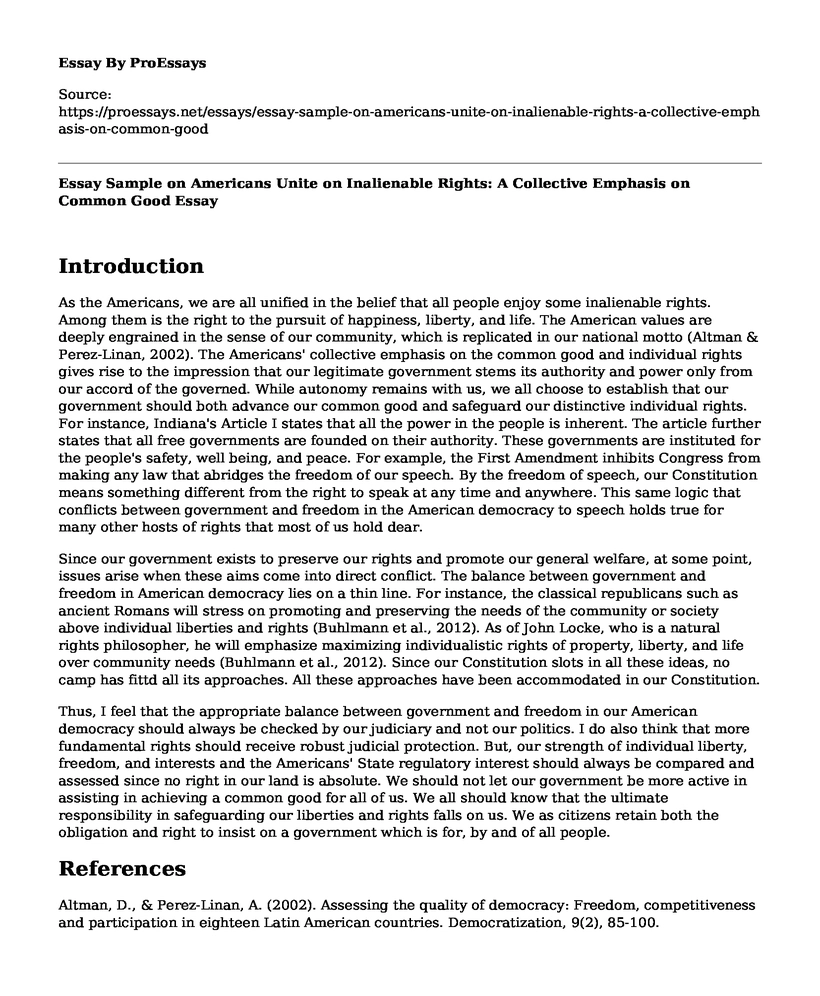Introduction
As the Americans, we are all unified in the belief that all people enjoy some inalienable rights. Among them is the right to the pursuit of happiness, liberty, and life. The American values are deeply engrained in the sense of our community, which is replicated in our national motto (Altman & Perez-Linan, 2002). The Americans' collective emphasis on the common good and individual rights gives rise to the impression that our legitimate government stems its authority and power only from our accord of the governed. While autonomy remains with us, we all choose to establish that our government should both advance our common good and safeguard our distinctive individual rights. For instance, Indiana's Article I states that all the power in the people is inherent. The article further states that all free governments are founded on their authority. These governments are instituted for the people's safety, well being, and peace. For example, the First Amendment inhibits Congress from making any law that abridges the freedom of our speech. By the freedom of speech, our Constitution means something different from the right to speak at any time and anywhere. This same logic that conflicts between government and freedom in the American democracy to speech holds true for many other hosts of rights that most of us hold dear.
Since our government exists to preserve our rights and promote our general welfare, at some point, issues arise when these aims come into direct conflict. The balance between government and freedom in American democracy lies on a thin line. For instance, the classical republicans such as ancient Romans will stress on promoting and preserving the needs of the community or society above individual liberties and rights (Buhlmann et al., 2012). As of John Locke, who is a natural rights philosopher, he will emphasize maximizing individualistic rights of property, liberty, and life over community needs (Buhlmann et al., 2012). Since our Constitution slots in all these ideas, no camp has fittd all its approaches. All these approaches have been accommodated in our Constitution.
Thus, I feel that the appropriate balance between government and freedom in our American democracy should always be checked by our judiciary and not our politics. I do also think that more fundamental rights should receive robust judicial protection. But, our strength of individual liberty, freedom, and interests and the Americans' State regulatory interest should always be compared and assessed since no right in our land is absolute. We should not let our government be more active in assisting in achieving a common good for all of us. We all should know that the ultimate responsibility in safeguarding our liberties and rights falls on us. We as citizens retain both the obligation and right to insist on a government which is for, by and of all people.
References
Altman, D., & Perez-Linan, A. (2002). Assessing the quality of democracy: Freedom, competitiveness and participation in eighteen Latin American countries. Democratization, 9(2), 85-100.
Buhlmann, M., Merkel, W., Muller, L., & Wessels, B. (2012). The democracy barometer: a new instrument to measure the quality of democracy and its potential for comparative research. European Political Science, 11(4), 519-536.
Cite this page
Essay Sample on Americans Unite on Inalienable Rights: A Collective Emphasis on Common Good. (2023, Mar 26). Retrieved from https://proessays.net/essays/essay-sample-on-americans-unite-on-inalienable-rights-a-collective-emphasis-on-common-good
If you are the original author of this essay and no longer wish to have it published on the ProEssays website, please click below to request its removal:
- Why Texas Should Not Lower the Drinking Age Essay
- A Discussion on How the Current Environment Could Affect the Way Criminal Investigations Are Conducted
- Undocumented Immigration and Healthcare Essay
- A Literature Review on Why Juvenile Delinquency Is Common Amongst the Latinos
- Essay Sample on Technology on the Border
- DHS Homeland Security Intelligence Center Essay Example
- OJJDP Strategies to Address Serious Juvenile Crime - Essay Sample







